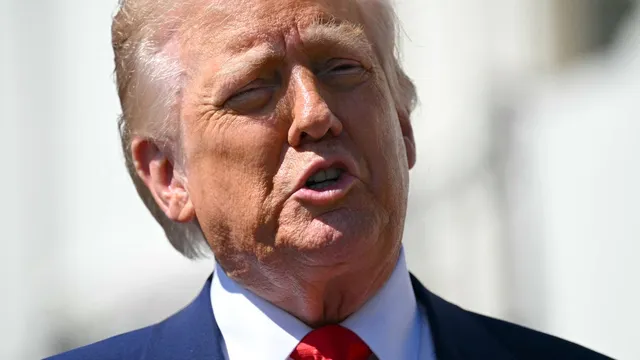
Nearly 70 countries seek trade talks with Trump administration amid tariffs
2025-04-09 20:47- Over 50 nations, including Japan, have contacted the White House to negotiate trade agreements following new tariffs.
- The Trump administration's tariffs aim to promote fair trade practices and strengthen U.S. manufacturing.
- Future negotiations could shape international trade relations significantly while seeking to balance various national interests.
Express your sentiment!
Insights
In the context of President Donald Trump's recent tariffs on imported goods, which were announced around early April 2025, significant international interest has emerged. Following the introduction of tariffs, which included a baseline levy of 10% and additional tariffs for countries with trade imbalances, numerous foreign governments began reaching out to negotiate new trade deals. Treasury Secretary Scott Bessent mentioned that countries like Japan are being prioritized in these negotiations due to their quick responses. While some nations have expressed willingness to reduce their tariffs, the situation remains fluid with escalating tensions surrounding trade policies. Officials have conveyed that while the tariffs aim to adjust unfair trade practices, the road to substantial negotiations may take considerable time. The Trump administration insists that the tariffs are a way to level the playing field, allowing American manufacturers to thrive. However, Republican senators and industry leaders have shown signs of unease regarding the long-term economic repercussions. They are calling for clearer communication from the White House about how these trade policies will progress and are seeking to assure that investor confidence remains intact. The White House has noted that, despite the backlash from other countries and domestic markets' volatility, this strategy is beginning to show progress as many countries currently under tariff discussion have come forward. The administration's approach has revealed a complicated trade landscape, where nations are urged to keep calm and present options for tariff reductions without escalating tensions further. Negotiations are expected to be arduous, reflecting both the disagreement over existing trade practices and a desire to find agreeable solutions moving forward. As these discussions unfold in months ahead, stakeholders from various sectors will be observing closely to evaluate how successful the Trump administration's new tariffs will be in fostering beneficial economic arrangements for the United States. The ongoing negotiations may shape the international trade landscape significantly in the following months as countries seek to protect their interests while navigating through a complex diplomatic environment.
Contexts
The imposition of tariffs by former President Donald Trump has had a significant impact on the global economy. These tariffs were primarily aimed at countries like China, as part of a strategy to reshape trade relations and reduce the U.S. trade deficit. However, the ramifications of these policies were not limited to the U.S. economy alone; they reverberated across global markets, affecting trade flows, supply chains, and economic growth projections. As countries responded to the tariffs with retaliatory measures, international trade dynamics changed dramatically, ushering in a period of economic uncertainty. Industries reliant on cross-border trade faced increased costs, which were often passed on to consumers, leading to inflationary pressures in various sectors globally. The initial intention of the tariffs was to protect domestic industries and jobs, but these objectives were frequently met with mixed outcomes. While some sectors like steel and aluminum showed temporary relief, others, particularly in agriculture, reported declines as foreign markets retaliated with their tariffs on U.S. goods. In response to these tariff policies, many countries sought to reduce their dependency on the U.S. market, leading to the establishment of alternative trade partnerships and agreements. For instance, China began strengthening its economic ties with other nations, thereby fostering new markets for goods previously exported to the United States. This shift not only increased competition for U.S. exports but also limited the effectiveness of the tariffs as a tool for economic leverage. Furthermore, the increased cost of materials resulting from tariffs undermined the global supply chains that many businesses had cultivated over decades. As a result, manufacturing and production processes faced disruptions, leading to a reevaluation of sourcing strategies by multinational corporations. The long-term effects of these tariffs contribute to a broader trend of deglobalization, where nations increasingly prioritize domestic production over international trade. While proponents argue that tariffs can protect strategic industries, critics emphasize the risks associated with protectionism, such as market inefficiencies and retaliation that can spiral into trade wars. The interconnected nature of the global economy means that actions taken by one nation can have widespread implications. This reality was evident during the pandemic, when the fragile state of global supply chains revealed vulnerabilities caused by previous tariff battles and trade conflicts, further complicating the recoveries of multiple economies. In conclusion, Trump's tariffs have initiated a profound reassessment of global trade relations, instigating challenges that extend well beyond the immediate economic effects. While aimed at bolstering the U.S. economy, they led to increased costs, altered supply chains, and a reconfiguration of global trading relationships. Moving forward, the lessons learned from this period will be crucial for policymakers seeking to navigate the complexities of trade in a world that is rapidly redefining the principles of economic cooperation. Understanding the intricate impacts of these tariffs will be essential to developing strategies that promote sustainable economic growth and maintain healthy international relationships.